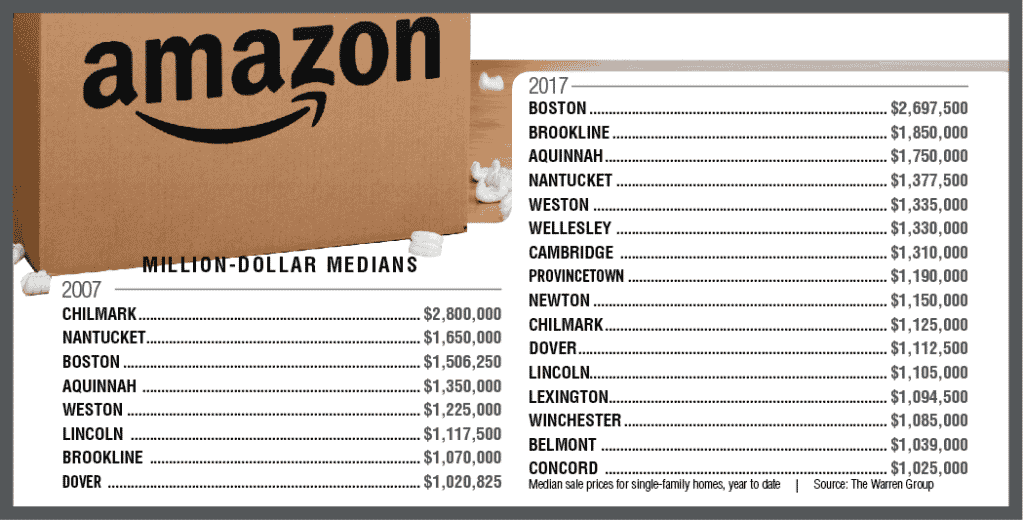Are you pumped that Amazon might pick Boston or even Somerville for its new global headquarters? Be careful what you wish for.
Mayors and newspaper columnists, lawmakers and business executives alike are stoked over the possibility that Jeff Bezos might pick Boston for his company’s new digs and bring with him 50,000 jobs. But apparently the folks who run this town would rather tiptoe around the elephant in the living room than spoil this delightful fantasy of Boston as Silicon Valley East.
With bidding wars for million-dollar fixer-uppers amid a dire shortage of new homes and apartments, where in the world are we going to put all these new Amazon executives and workers? And what on earth is to happen to our already broken transportation system, with trains that refuse to run on time and traffic jams on what were once back roads?
Go ahead, call me an alarmist. But first take a look at what Google and other tech giants have done to San Francisco, where locals have gone from loving their iconic corporate giants to seething with resentment.
Google has since 2007 quadrupled its payroll and then some, boosting its head count from 16,800 to 72,000 workers worldwide. Today the tech behemoth has 20,000 employees alone at its Silicon Valley campus in Mountain View, with plans to add 31,000 more through a massive headquarters expansion.
The growth has not gone unnoticed in the Bay Area, to say the least. In fact, it’s been hard to miss, with Google for years hiring deluxe private buses to shuttle their employees from their luxury digs in San Francisco to their offices in Mountain View.
Tellingly, housing activists have spent years leading the protests against buses, which, along with being a nuisance, have become an emblem of 21st century tech world privilege. The big “Kill Tech Zilla” mural in the Mission District sums up the populist backlash.
But there’s also deep anger at what has happened to housing prices amid all this torrid growth and expansion – and the failure of city and state officials to adequately deal with the fallout on the lives of long-time San Franciscans.
SF’s median home price hit an unbelievable $1.3 million this spring – well above its last peak of just under $900,000 in 2007. People have been forced to resort to ever more creative and desperate measures to keep a roof over their heads, from living in vans to a man who lives in a bed-sized box in his friend’s living room for $400 a month.
The city approved just half of the housing permits needed from 2007 to 2014 to keep up with population growth, the San Francisco Business Times has reported.
Prices Already on the Rise
So what has this go to do with Boston and its hunt to land Amazon? Well, everything.
Without a crash course aimed at dramatically boosting new housing construction and fixing our shaky transit system, a massive tech company expansion will push our already teetering housing market over the edge.
The number of communities with median prices above $1 million has doubled in the past decade. More and more communities once considered affordable for middle-class families are seeing prices rising into the range of $500,000, $600,000, $700,000 and up.
And like San Francisco, the big culprit has been the failure, especially in Boston’s suburbs, to build anywhere near the amount of new homes, condos and apartments needed to keep up with demand.
It’s not that landing Amazon, in and of itself, would be a bad thing. Certainly 50,000 is a lot of jobs and a lot of opportunities for people across the Boston area and beyond.
 However, to plunge ahead in pursuit of this huge prize without truly examining what needs to be done to accommodate such massive growth is more than just myopic. It’s downright callous in its disregard for the daily struggle most people face paying their bills in one of the most expensive places to live in the country.
However, to plunge ahead in pursuit of this huge prize without truly examining what needs to be done to accommodate such massive growth is more than just myopic. It’s downright callous in its disregard for the daily struggle most people face paying their bills in one of the most expensive places to live in the country.
A sober assessment of where Greater Boston stands right now when it comes to our stressed-out housing market and transit system – and what needs to be done to fix these chronic problems – would inspire far more confidence.
Sure, there are glimmers here and there. Boston Mayor Marty Walsh is certainly pushing hard for new housing in the city, while Gov. Charlie Baker recently touted a relatively modest goal of 100,000 new units.
Yet it’s largely its tap-dancing around the issue. So here’s some advice for those on high – cut the happy talk about how great a city or state we live in, how lucky we all are. That’s the blue-sky view from the affluent bubble in which you live, along with tech and biotech executives, high-powered lawyers, hot-shot developers and private investors. Level with the people you represent. And that means everyone, not just the affluent few who don’t have to worry about making the mortgage payment or whether the train will show up late once again.
Acknowledge the reality that for the vast majority of those living in the Boston area, home prices and rents are unacceptably high. And promise to do something about it, even if it means pissing off NIMBY suburban officials by forcing them to open their doors to more housing.
Same goes for our wretched roads and trains. No, it’s not acceptable to for a great city to have a third-world transportation system. Then pledge to fight to fix it and pursue what’s right, even if it costs you your job.
When I hear that kind of talk from our elected leaders, then sure, maybe I’ll jump on the Amazon bandwagon. But until then, no go.










